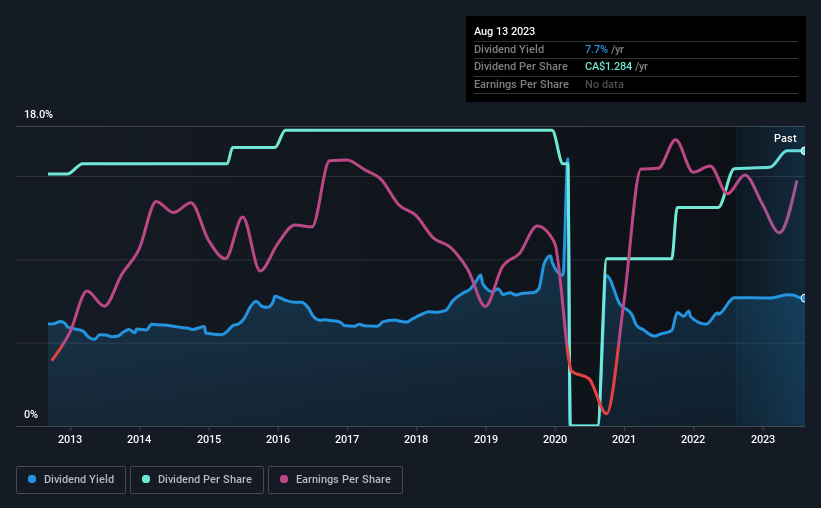Only Four Days Left To Cash In On Boston Pizza Royalties Income Fund's (TSE:BPF.UN) Dividend
It looks like Boston Pizza Royalties Income Fund (TSE:BPF.UN) is about to go ex-dividend in the next 4 days. The ex-dividend date is usually set to be one business day before the record date which is the cut-off date on which you must be present on the company's books as a shareholder in order to receive the dividend. The ex-dividend date is important because any transaction on a stock needs to have been settled before the record date in order to be eligible for a dividend. Meaning, you will need to purchase Boston Pizza Royalties Income Fund's shares before the 18th of August to receive the dividend, which will be paid on the 31st of August.
The company's next dividend payment will be CA$0.11 per share. Last year, in total, the company distributed CA$1.28 to shareholders. Based on the last year's worth of payments, Boston Pizza Royalties Income Fund has a trailing yield of 7.7% on the current stock price of CA$16.74. We love seeing companies pay a dividend, but it's also important to be sure that laying the golden eggs isn't going to kill our golden goose! So we need to check whether the dividend payments are covered, and if earnings are growing.
View our latest analysis for Boston Pizza Royalties Income Fund
If a company pays out more in dividends than it earned, then the dividend might become unsustainable - hardly an ideal situation. Boston Pizza Royalties Income Fund paid out 72% of its earnings to investors last year, a normal payout level for most businesses. A useful secondary check can be to evaluate whether Boston Pizza Royalties Income Fund generated enough free cash flow to afford its dividend. Over the last year it paid out 74% of its free cash flow as dividends, within the usual range for most companies.
It's encouraging to see that the dividend is covered by both profit and cash flow. This generally suggests the dividend is sustainable, as long as earnings don't drop precipitously.
Have Earnings And Dividends Been Growing?
Companies with consistently growing earnings per share generally make the best dividend stocks, as they usually find it easier to grow dividends per share. If business enters a downturn and the dividend is cut, the company could see its value fall precipitously. This is why it's a relief to see Boston Pizza Royalties Income Fund earnings per share are up 4.9% per annum over the last five years. Earnings growth has been slim and the company is paying out more than half of its earnings. While there is some room to both increase the payout ratio and reinvest in the business, generally the higher a payout ratio goes, the lower a company's prospects for future growth.
The main way most investors will assess a company's dividend prospects is by checking the historical rate of dividend growth. In the last 10 years, Boston Pizza Royalties Income Fund has lifted its dividend by approximately 0.9% a year on average.
To Sum It Up
Has Boston Pizza Royalties Income Fund got what it takes to maintain its dividend payments? Earnings per share have been growing modestly and Boston Pizza Royalties Income Fund paid out a bit over half of its earnings and free cash flow last year. Overall, it's not a bad combination, but we feel that there are likely more attractive dividend prospects out there.
So if you want to do more digging on Boston Pizza Royalties Income Fund, you'll find it worthwhile knowing the risks that this stock faces. To that end, you should learn about the 3 warning signs we've spotted with Boston Pizza Royalties Income Fund (including 1 which is a bit unpleasant).
A common investing mistake is buying the first interesting stock you see. Here you can find a full list of high-yield dividend stocks.
Have feedback on this article? Concerned about the content? Get in touch with us directly. Alternatively, email editorial-team (at) simplywallst.com.
This article by Simply Wall St is general in nature. We provide commentary based on historical data and analyst forecasts only using an unbiased methodology and our articles are not intended to be financial advice. It does not constitute a recommendation to buy or sell any stock, and does not take account of your objectives, or your financial situation. We aim to bring you long-term focused analysis driven by fundamental data. Note that our analysis may not factor in the latest price-sensitive company announcements or qualitative material. Simply Wall St has no position in any stocks mentioned.

